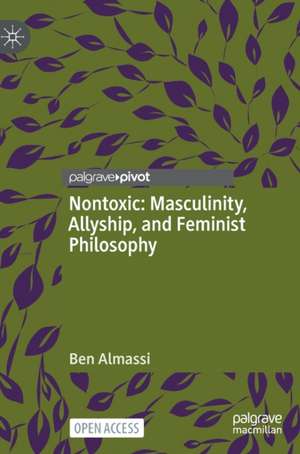Nontoxic: Masculinity, Allyship, and Feminist Philosophy
Autor Ben Almassien Limba Engleză Hardback – 31 aug 2022
Preț: 231.98 lei
Nou
Puncte Express: 348
Preț estimativ în valută:
44.39€ • 48.37$ • 37.40£
44.39€ • 48.37$ • 37.40£
Carte tipărită la comandă
Livrare economică 23 aprilie-07 mai
Preluare comenzi: 021 569.72.76
Specificații
ISBN-13: 9783031130700
ISBN-10: 3031130707
Pagini: 116
Ilustrații: IX, 116 p.
Dimensiuni: 148 x 210 mm
Greutate: 0.3 kg
Ediția:1st ed. 2022
Editura: Springer International Publishing
Colecția Palgrave Macmillan
Locul publicării:Cham, Switzerland
ISBN-10: 3031130707
Pagini: 116
Ilustrații: IX, 116 p.
Dimensiuni: 148 x 210 mm
Greutate: 0.3 kg
Ediția:1st ed. 2022
Editura: Springer International Publishing
Colecția Palgrave Macmillan
Locul publicării:Cham, Switzerland
Cuprins
Chapter 1: Alternatives to Toxicity.- Chapter 2: Masculinity in Early Feminist Philosophy.- Chapter 3: Androgyny and the End of Manhood.- Chapter 4: Feminist Reclamations of Masculinity.- Chapter 5: Allyship and Feminist Masculinity.- Chapter 6: Allyship Masculinities in the Unjust Meantime.
Notă biografică
Ben Almassi is a Professor of Philosophy and Affiliated Faculty in Gender & Sexuality Studies, Political & Social Justice Studies, and Interdisciplinary Studies at Governors State University, USA.
Textul de pe ultima copertă
This open access book argues for allyship masculinity as an open-ended, intersectional model for feminist men. It provides a roadmap for navigating between toxic masculinity on one side, and feminist androgyny on the other. Normative visions for what men should be take many forms. For some it is love and mindfulness; for others, wildness and heroic virtue. For still others the desire to separate a healthy manhood from toxic masculinity is a mistake: better to refuse to be men and salvage our humanity. Though Ben Almassi challenges the visions that Mary Wollstonecraft, bell hooks, and others have offered, he shares their belief that masculinity can be grounded in feminist values and practices. Almassi argues that we can make sense of relational allyship as practices of feminist masculinity, such that men can make distinctive and constructive contributions to gender justice in the unjust meantime.
Caracteristici
This book is open access, which means that you have free and unlimited access Explores allyship masculinity as an open-ended, intersectional model for feminist manhood. Argues that the roadmap for nontoxic masculinity can be found in feminist values and practice.
